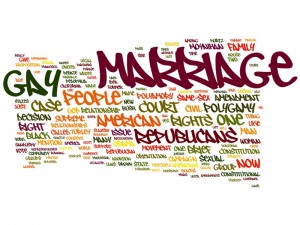The legislative impact of the 1996 Defense of Marriage Act (DOMA) came under heavy fire during oral arguments before the Supreme Court yesterday, with enough justices questioning its effect to signal it may be struck down on states’ rights grounds. Meanwhile, the court’s conservative wing wondered if the “new regime” had instituted a “new world” of jurisprudence, slamming what is regarded as the Obama administration’s hypocritical stance on the law.
“I’m certainly concerned when you have potentially five justices question the federal Defense of Marriage Act,” Mat Staver of Liberty Counsel told OneNewsNow.com. “If for some reason the court had five justices vote to strike down Proposition 8 or the federal Defense of Marriage Act under some concoction that it was prohibited by the Constitution, that would have catastrophic effect.”
Such a decision, he warned, would put the court “on a direct collision course with religious freedom and freedom of speech.”
The court’s four liberal justices and Anthony Kennedy took a harsh look at a number of the law’s provisions.
Justice Ruth Bader Ginsburg, a former ACLU attorney, said by denying federal benefits to homosexual couples, DOMA creates “two kinds of marriage: the full marriage, and then this sort of skim milk marriage.”
Former Solicitor General Paul Clement, who represented the House of Representatives in defending DOMA, said it was the states that created a patchwork of laws varying from state to state. The 1996 law, signed by President Bill Clinton, defined the institution only for the federal government’s purposes.
But Justice Kennedy seemed to argue this somehow violated states’ rights. “Your statute applies also to States where the voters have decided” in favor of redefining marriage, he told Clement. Kennedy later said the law was “inconsistent” and helped states only “if they do what we want them to.”
Allowing the federal government the right to define marriage for itself hardly violates the Tenth Amendment, according to Ed Whalen of NRO‘s “Bench Memos.”
“Under the immigration laws, a marriage entered into for the purpose of gaining an immigrant’s admission will be disregarded even though that marriage remains valid under state law,” he wrote. “How could anyone imagine that federalism means that a state’s authority to regulate marriage for state-law purposes should intrude on how the federal government operates in these and other areas?”
The Obama administration took heavy criticism from multiple justices for its decision to enforce DOMA while at the same time stating that it is unconstitutional and refusing to defend the law in court.
Chief Justice John Roberts said, “If he has made a determination that executing the law by enforcing the terms is unconstitutional, I don’t see why he doesn’t have the courage of his convictions.”
Justice Antonin Scalia wondered “if we’re living in this new world where the Attorney General can simply decide, yeah, it’s unconstitutional, but it’s not so unconstitutional that I’m not willing to enforce it…if that’s the new regime in the Justice Department that we’re dealing with.”
Liberal Justice Stephen Breyer had a surprisingly harsh exchange with U.S. Solicitor General Donald Verrilli, who has argued that states that adopt civil unions have no right to deny homosexuals the right to marry. Verrilli said refusal to grant any such unions may be a violation of homosexual “rights.”
If that is the case, Breyer replied, “then all States have to have something like pacts [civil unions]. And if they have to have something like pacts, then you say then they also have to allow marriage. So, then are you not arguing they all have to allow marriage? And then you say no.”
Clement and Kennedy found agreement on other issues.
Clement called the Justice Department’s brief “the most anomalous motion to dismiss in the history of litigation: A motion to dismiss, filed by the United States, asking the district court not to dismiss the case.”
“That would give you intellectual whiplash,” Kennedy replied. “I’m going to have to think about that.”
SCOTUSblog noted, “The Justices seemed somewhat at odds over whether they do have the authority to go ahead with this case, so the possibility remained that the Court in the end could choose not to decide the merits of the law’s validity.”
Some of the justices may have learned from the 40-year controversy surrounding the Roe v. Wadedecision that imposing the outcome of a highly divisive social issue while the debate is still boiling nationwide only rends the common fabric of society.




